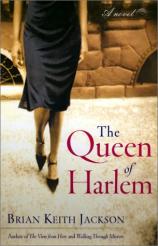Reading Group Guide
Discussion Questions
The Queen of Harlem: A Novel

1. Jackson opens his novel with a quote from Nelson Mandela: “We ask ourselves, ‘Who am I to be brilliant, gorgeous, talented, and fabulous?’ Actually, who are you not to be?” In what ways does Mason fear his talent and economic power? What does the final chapter tell us about Carmen’s true fears?
2. How does the evolution of Harlem reflect the lives of its residents? What does the opening scene convey about Harlem’s second Renaissance, especially compared to its first one in the early twentieth century?
3. What is the symbolic role of Jim, Mason’s dread-headed white buddy from college? Besides being the character who knows the truth about Mason, what does Jim’s presence say about authenticity in general, particularly among whites who appropriate aspects of black culture? How does Malcolm’s role compare with Jim’s?
4. When Mason steps off the number six train and receives his stinging introduction to Harlem from the real Malik, what keeps Mason from heading back downtown? What drives him to stay and invent a “ghettonian” version of himself?
5. How is Mason transformed by his mugging? What kind of turning point occurs during that scene, particularly when he orders his mugger to listen to the stolen CD?
6. Mason receives a lot of mothering. Compare the mothering styles of Joyce and Carmen. How do those two differ from Granny and her generation?
7. How is Mason’s attraction to Carmen different from his attraction to Kyra? What do both women teach Mason about “keeping it real”? Why is Kyra able to navigate the fine line between privilege and greed so successfully?
8. Though the chasm between rich and poor is a universal source of friction, why is this friction sometimes particularly intense in black America? Why is the real Malik so personally offended by Mason’s clean-cut appearance? What does Jackson tell us about the way wealth and destitution coexist in Harlem today?
9. As part of his disguise, Mason has to learn a new dialect. What does his new speech style suggest about the urge to shun the language of your oppressors? What are some of the empowering characteristics of Mason’s new way of communicating? How does he feel about his old mannerisms when he has to make small talk with Kyra’s parents?
10. New York is often thought of as a city where it’s possible to reinvent yourself an unlimited number of times. As Mason travels among several neighborhoods, and particularly when he is forced to walk a hundred blocks to get home, what does he observe about the many identities of New York itself?
11. What does Mason’s mother reveal to him at The Four Seasons? Does her arrival provide him with an even bigger dose of reality than Harlem?
12. As much as Carmen wanted to be the Queen of Harlem, didn’t Mason equally enjoy playing the part of her courtesan? What does the final chapter say about the imaginary quality of all self-perception?
13. In her farewell note to Mason, Carmen says, “Sometimes freedom is slavery in disguise.” When has that phrase proven true in your life? What has enslaved Mason and Carmen throughout the novel?
14. Discuss some of the ways in which Mason’s Harlem experience plays out in your town or neighborhood. When have you felt compelled to hide behind a false self? What are some of the daydreams that keep you going?
The Queen of Harlem: A Novel
- Publication Date: August 22, 2012
- Hardcover: 256 pages
- Publisher: Doubleday
- ISBN-10: 0385502958
- ISBN-13: 9780385502955







